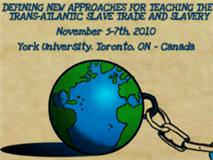Teaching African History workshop

- © The Harriet Tubman Institute
The Tubman Institute, in partnership with UNESCO, successfully hosted a workshop on the Teaching of African History, in Founders College, York University, from November 5 to 7, 2010. The workshop was opened by Mamdouh Shoukri, President of York University, who welcomed 35 presenters and over 70 participants.
The workshop featured a series of seminars covering various aspects of teaching African history, the history of the African diaspora, the history of slavery and the history of slave trades. It included two video presentations and a virtual inter-active seminar in four languages (English, French, Spanish and Portuguese) that was broadcast simultaneously around the world by internet.
The highlight of the workshop was a series of seminars that focused on the psychological effects of slavery and the slave trade. On the final day of the workshop the participants approved a resolution which encourages curriculum reform within educations systems around the world to incorporate the teaching of African history, the history of the African diaspora and the history of slavery and slave trades.
- For further information about the workshop and its follow-up, click here to visit the workshop website.
- To view the virtual seminar, click here.
Working session with the Harriet Tubman Institute
Following the seminar, representatives of UNESCO’s Paris office met with Professor Paul Lovejoy and his colleagues at the Tubman Institute to discuss the measures that they will take in partnership to follow up on the workshop and the final resolution.
A focus of the discussion was the year 2011, declared by the United Nations as the “International Year for persons of African Descent.” The Tubman Institute and its national partners propose that, in the year 2011, UNESCO recognize a series of Underground Railroad sites within the framework of UNESCO’s “Itinerary of Memory” programme.
- Source:The Harriet Tubman Institute/UNESCO
- 10-11-2010

